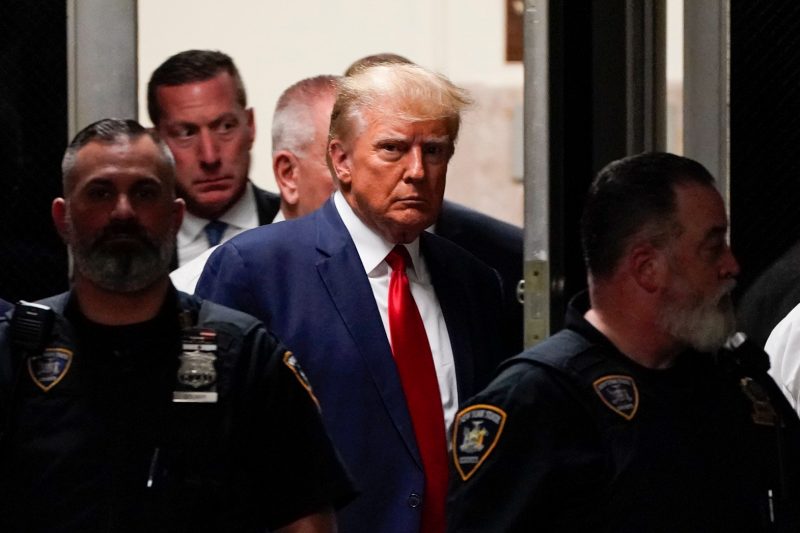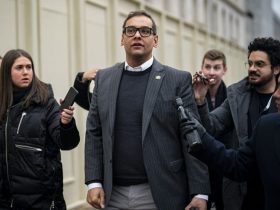Special counsel Jack Smith has obtained a 2021 recording in which Donald Trump appears to brag about having a classified document related to Iran, suggesting the former president understood both the legal and security concerns around his possession of such restricted information, multiple people familiar with the matter said Wednesday.
The recording was made at a meeting at Trump’s golf course in Bedminster, N.J., said the people, who like others interviewed for this article spoke on the condition of anonymity to discuss an ongoing criminal investigation. The audio features Trump describing a multi-page document that he claims is about possibly attacking Iran, expressing a desire to share that information with others but also making some kind of acknowledgment that he shouldn’t do so, the people said.
The existence of the recording was first reported by CNN. It has not been made public, and the people familiar with it would not describe Trump’s statements verbatim. But for Justice Department prosecutors examining Trump’s possible mishandling of classified documents after leaving the White House, the audio could be important evidence about Trump’s state of mind and his understanding of the rules about classified information — and it might show the path of certain sensitive documents once they left the White House.
Trump’s lawyers have suggested that the former president either did not know he possessed classified documents after leaving the White House or could have declassified such material while in office.
“If you have the authority to declassify, you are not wedded to any bureaucratic process,” Trump lawyer James Trusty said Wednesday night on CNN.
Smith’s investigation appears to be centered on classified material discovered last August at Mar-a-Lago, Trump’s Florida home and private club, weeks after the Justice Department demanded the return of all documents marked classified and a lawyer for Trump handed over documents said to be responsive to that subpoena.
The Washington Post reported last year that among the sensitive documents recovered by the FBI was a document describing Iran’s missile program. It’s unclear if that document is the same one described in the audio recording. The Post has also reported that investigators suspect Trump’s motive for keeping classified material after leaving the White House may have been mostly ego, and that he insisted the documents were his property, not the U.S. government’s.
For the Justice Department, evidence that Trump knew he had classified material, and understood the restrictions on sharing it, would be an important part of any charging decision.
A spokesman for Smith declined to comment. A Trump spokesperson replied to an email seeking comment by decrying leaks about the investigation, which he said “are designed to inflame tensions and continue the media’s harassment of President Trump and his supporters.”
In a section of his book, “The Chief’s Chief,” Trump’s former chief of staff, Mark Meadows, appears to describe the meeting where the recording obtained by the Justice Department was made.
The book mentions Trump discussing a document he tries to link to a frequent target of his ire at the time, Gen. Mark A. Milley, the chairman of the Joint Chiefs of Staff. Meadows describes a scene at Bedminster in which a relaxed, post-presidency Trump expounds on how he is waiting to re-engage with politics at a time of his choosing.
“The boss leans back in his chair, dressed in a sport coat and a crisp white shirt that’s open at the neck. He looks at least twenty pounds lighter than he was in office,” Meadows’s book says. “The president recalls a four-page report typed up by Mark Milley himself. It contains the general’s own plan to attack Iran, deploying massive numbers of troops, something he urged President Trump to do more than once during his presidency. President Trump denied those requests every time.”
At that time, Trump complained frequently about Milley, a reaction to anecdotes in books and news articles that cast Trump in a bad light and described Milley as defending democracy from the then-president’s darker impulses.
A spokesman for Milley declined to comment, as did a lawyer for Meadows.
Two people familiar with the recorded conversation said Smith’s prosecutors have asked witnesses about Trump’s apparent awareness that the document he was discussing at Bedminster was something sensitive that he could not share or declassify after leaving office.
Milley never recommended attacking Iran, former military officials have said. But people familiar with his briefings to the president said it was customary for the Pentagon to prepare numerous memos outlining various military options to respond to a foreign adversary, and Milley would outline the pros and cons of each option. In discussing options for addressing Iran, the Pentagon did have a memo, which was not authored by Milley, for a military attack on Iran as one conceivable option, these people said.
The strange legal and national security saga of how hundreds of classified documents followed Trump to Florida after he left the White House began in 2020, when the National Archives and Records Administration began seeking the return of what it suspected were presidential records — historical documents that are government property.
After months of back-and-forth, 15 boxes of papers from Mar-a-Lago were returned in early 2022. When archives officials opened the boxes, they found more than 100 classified documents scattered among the various items.
That led to questions about whether Trump had more classified papers at his Florida home. Served with the grand jury subpoena in the spring, Trump’s lawyers handed over an additional 38 classified documents in a sealed envelope last June. But FBI agents later obtained evidence suggesting that Trump was holding onto even more documents, leading them to obtain a court order for an Aug. 8 search of the property in which agents found more than 100 classified documents.
In November, after Trump launched another bid for the White House, Attorney General Merrick Garland appointed Smith to lead the documents investigation, along with a more sprawling investigation into efforts to block the 2020 election results and events surrounding the Jan. 6, 2021, riot at the U.S. Capitol.
Trump’s attorneys have taken steps in recent weeks in the documents case — including outlining his potential defense to members of Congress and seeking a meeting with the attorney general — that suggest they believe a charging decision is getting closer.
Over the past week, The Post has reported that investigators have video footage and other evidence that shows two Trump employees at Mar-a-Lago moved boxes of documents into a storage area just before Justice Department officials came to retrieve material in response to the subpoena, and that one of the employees later asked how long material captured by surveillance cameras at the property was kept before being erased.
Perry Stein and Jacqueline Alemany contributed to this report.








